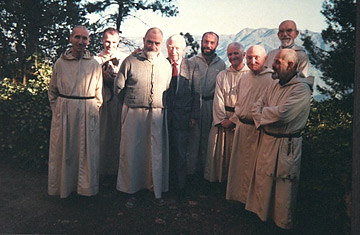
Trappist monks from the Tibhirine monastery in the Atlas region of Algeria, whose execution in 1996 was blamed on the GIA
(2 of 2)
News of Buchwalter's testimony has prompted others with knowledge of the case to go public. Former French anti-terrorism magistrate Alain Marsaud noted on July 7 that he, too, had alerted his superiors that an Algerian intelligence official had told him that the army had been responsible for the killings. That warning, Marsaud says, was "intentionally buried." Father Armand Veilleux, who in 1996 was procurator general of the Cistercian order in Rome, says he met stiff resistance from French officials in Algiers when he insisted on seeing the corpses — and was ultimately told only the heads had been recovered. Veilleux says the officials then ordered him to keep what he had been told secret. "We're convinced the bodies were never recovered because they were riddled with bullets — something that would have discredited Algeria's official version and revealed the active complicity by French officials in covering the truth up," says lawyer Baudouin.
Similar doubts exist about the official story in the Pakistan bombing case. French counterterrorism officials have been privately airing their skepticism about jihadist responsibility for the 2002 attack for months. In June, word leaked to the press that the investigating magistrates handling the case had all but abandoned the idea that al-Qaeda was behind the bombing. Lawyers representing families of the attack's French victims told reporters they'd received a briefing by Trévidic and fellow judge Yves Jannier in which they were told that Pakistani officials may have organized the strike. This new theory hinges on the change in France's government in 1995, a year after Paris signed a $1 billion deal to sell Agosta submarines to Pakistan. The cabinet of newly elected President Jacques Chirac decided to hold back payment of some $33 million in kickbacks that had been promised to Pakistani officials. French security officials tell Time that investigators have obtained documents and testimonies from people involved with the deal naming Pakistani officials who were designated to receive "commissions" for their help.
Investigators speculate that in 2000, when France applied an international anticorruption convention banning all kickbacks, those Pakistani officials grew angry. French authorities suspect that members of Pakistan's overlapping military, intelligence and political circles then decided to settle their score by symbolically targeting the French submarine engineers tied to the contract, manipulating extremists whom Pakistan has long been accused of supporting to carry out the suicide bombing. Pakistan has denied all the accusations; a spokeswoman for President Ali Zardari calls them "farcical at best."
On July 7, in response to the furor the monk-case allegations had provoked, Sarkozy agreed to "declassify all documents justice officials request" to enable investigating judges to "continue getting all means to conduct their inquiry." Two days later, he extended that offer to the Karachi bombing investigation. The President had initially derided the idea that the bombing might have been a Pakistani revenge attack as "grotesque." "Who would ever believe such a fable?" he asked.
That question and its answer are exactly why France needs independent investigating magistrates, some French legal practitioners say. They point to the two terrorism cases as proof of the vital role of magistrates, who perform an evidence-collecting function that has been central to France's justice system for over 200 years. Sarkozy's proposed reforms will shift investigative power from independent magistrates to state prosecutors, who, critics of the reforms fear, might end up paying more attention to the political interests of leaders than to justice. That could result in French justice bending to the whims of politicians as it did in the 1970s and '80s when magistrates found themselves unable to resist political meddling. Judges eventually found a way of seizing their power back by conniving to get details of investigations into the press before they could be stopped. Some believe that the French system's tradition of independence itself is now under threat.
France's Napoleonic justice system may indeed need modernizing. The question is whether reforms will undermine some of its most cherished values.
